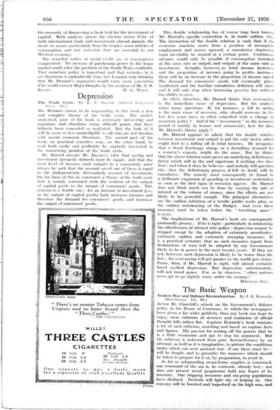The Trade Cycle. By R. F. Hurroc 1. (Oxford Univc;rsity
Press. 10s.) MIL HARROD claims to be expounding in this book a new and complete theory of the trade cycle. The earliei-. analytical, part of his book is extremely interesting and ingenious, and elucidates many difficult points that have hitherto been concealed or neglected. But the bulk of it will be more or less unintelligible to all who arc not familiar with recent ecominc. literature. The second part of the hook, on practical remedies, may, on the other hand, be read both easily and profitably by anybody interested in the tormenting problem of the trade cycle.-
Mr. Harrod accepts Mr. Keynes's view that saving and investment (properly defined) must be equal ; and that the
• total level of incomes (and output) in a 'community Must always be such that the amount saved out of them is equal to the (independently determined) amount of investment. On the basis of this he constructs a theory of the trade cycle that is mainly concerned with the relation of the output of capital goods to the output Of consumers' goods. This relation is a double one ; for an increase in investment (i.e., in the output of capital goods) both increases incomes and
• therefore the demand for consumers' goods, and increases the output of consumers goods.
This double relationship has of course long been known. - Mr.--1-larrod's . specific-contention is, in 'etude-ntittme, -this. -4-he interaction--of -the . double relation is such that-if the economic machine starts from a position of incomplete • employment and moves upward, a cumulative depression must inevitably be started at a certain point. Continuous advance would only be possible if consumption increased - at the same rate as output, and output at the same rate: as
investment. Actually, however, as total income increases, and the proportion of incomes going to profits increases,
there will an:increase-in the proportion of -income sage d. The demand fOr consumers' goods Will eventually prove -insufficient and the familiar cumulative deflation will start. and it will only stop when increasing poverty has reduced the ability to save.
In effect, therefore, Mr. Harrod thinks that over-saving
-is the immediate cause of depression. But his analysis raises many questions. -If, for instance, a fall in saving is the main cause of recovery, why should recovery in the last five years have so often coincided with a change in monetary policy ? And if the " investment " in the recovery- period is mainly in houses and armaments, how far does Mr. Harrod's theory apply ?
•• Mr. Harrod appears to - admit that the double relation between investment and output is not The only factor Which 'ight lead to a falling Off in total incomes. He recognises that a Stock Exchange slump, or a dwindling demand for a country's exports, might do the same. But lie thinks that the above relation must prove an underlying deflationary factor which will in the end supervene if nothing else does first : and when it does, lie believes—and nobody will question this—that the deflationary process, if left to itself, will be cumulative. The remedy must consequently be found in a. deliberate expansion of spending or investment undertaken as soon as the first signs of recession appear. Mr. Harrod does not think much can be done by varying the rate of interest or the voluMe of money, since the effects are not likely to be powerful enough. The principal alternatives are the sudden initiation of a terrific public works plan, or the sudden unbalancing of the Budget. And even these measures must be taken before the " breathing space "
is over. . .
The implications of Mr. Harrod's book are consequently
profoundly gloomy. If he is right—particularly in minimising the effectiveness of interest rate policy—depiession cannot be stopped except by the adoption of extremely unorthodox, extremely sudden and extremely sweeping measures. It is a practical certainty that no such measures (apart from declarations of war) will be adopted by any -Government likely to be in power in the next twenty years. If they arc not, however, each depression is likely to be worse than the last ; for over-saving will get greater as the world gets richer. Peace, then, if Mr. Harrod is right, will almost certainly breed cyclical depression. But depression, unfortunately, will not breed peace. For, as he observes, " other nations seem apt to go slightly crazy under the scourge."
DOUGLAS JAY.














































 Previous page
Previous page